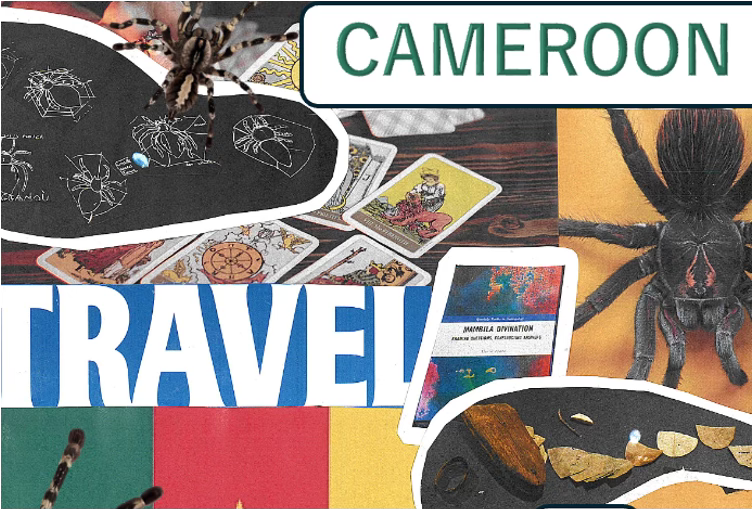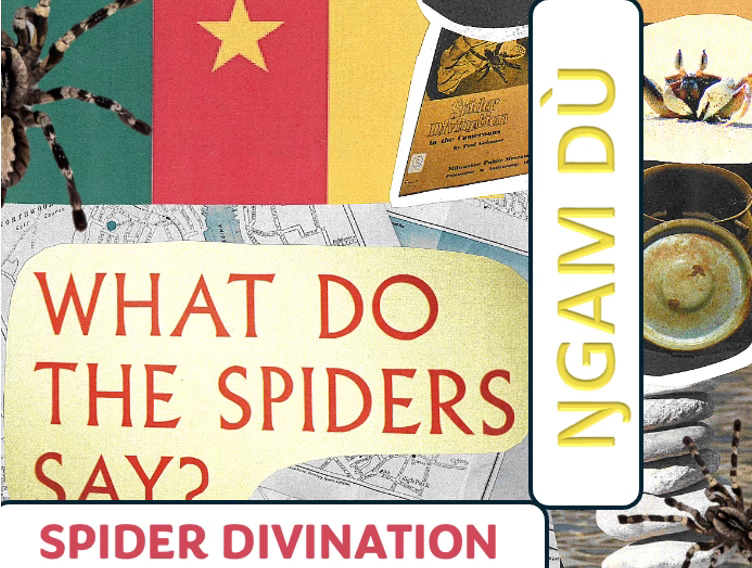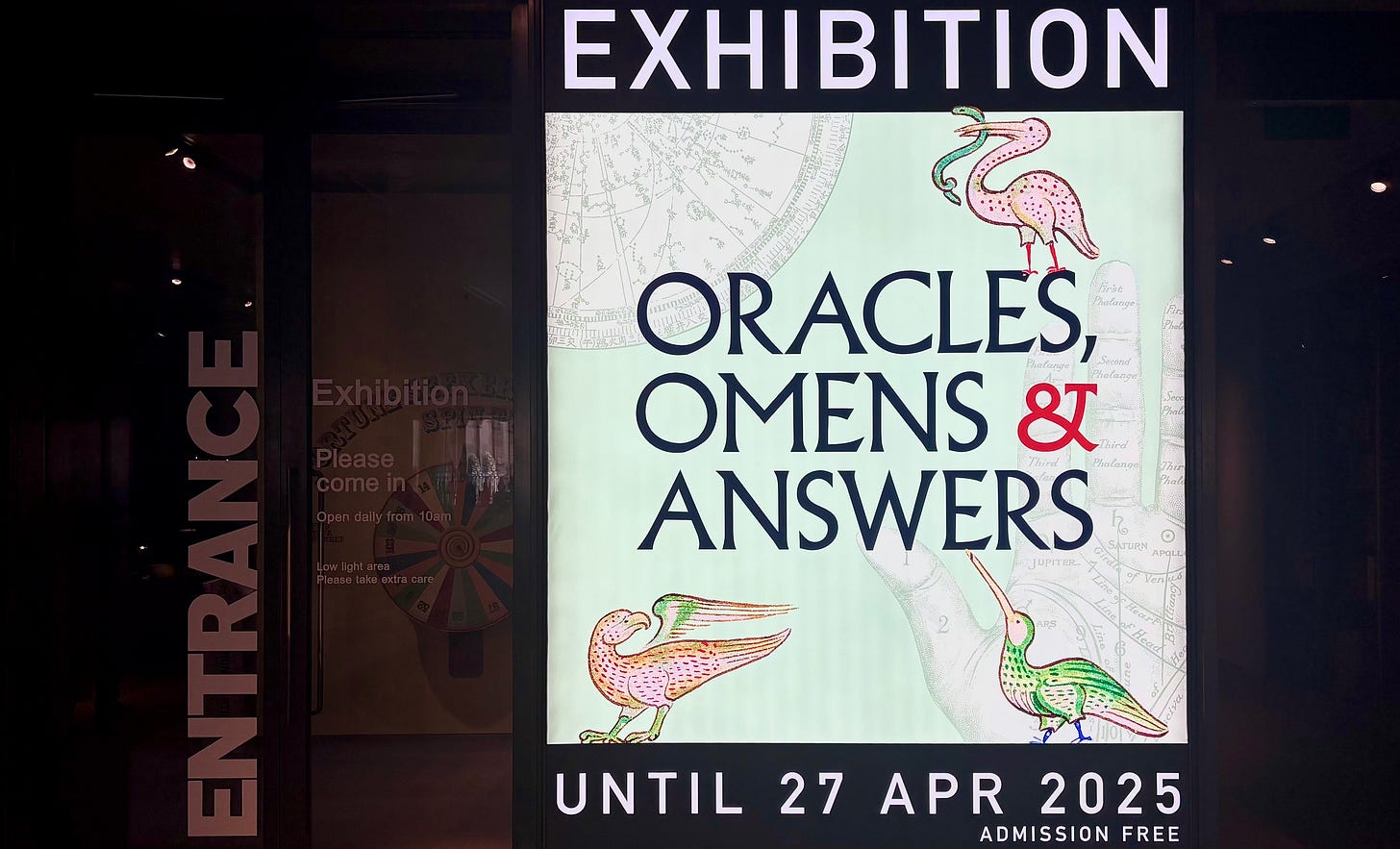How to answer life’s big questions? Spider divination.
For decades the Mambila in Cameroon have used spider divination and its long rich history for resolving everyday concerns and even as evidence in the country's courts.
For the Mambila people in Cameroon spider divination is used to answer everyday concerns or queries. The process consists of a broken pot being placed over a small hole in the ground where the spider or land crab lives. The diviner then places a stick, stone and array of leaf cards in the broken pot. The stick and the stone signifying either ‘yes’ or ‘no’ while the leaf cards are used to add further clarity by the diviner. To gain the attention of the spider, the diviner will often tap the rim of the broken pot with the stone, and proceed to ask them the question, this is often done in Mambila, their regional language.
Unlike other forms of divination which are sometimes used as games or forms of entertainment spider divination within the Mambilla is taken seriously. With the results often being used as evidence in the chief's courts in both recent and historical times.
Professor David Zeitlyn, an initiated diviner spoke to me about the matter saying “the chief's court is the first place that disputes are settled” and that “in the village, an awful lot of things are resolved at the chief's court”. This often includes cases of adultery, theft and in extreme cases witchcraft.
Often when consulting with the spiders multiple spiders are consulted at once. After the questions have been asked and an estimated 45 minutes have elapsed the diviner goes back to the divining spot to see if the spider has responded yet. If they have not replied yet they will continue to check back throughout the day.
On a daily basis, each spider is involved with multiple lines of enquiry, when speaking to Professor David Zeitlyn he noted that “You take us a grass or a twig, and you break it and you say to the spider, that's the end of those questions”.
More than just ‘spiders’
After speaking with Professor David Zeitlyn, who visits the village on an annual basis and acts as an initiated diviner, I was able to understand to what extent the Mambilla people respect and value the spiders.
With Professor David Zeitlyn saying “they treat them like people”. The spiders are even provided with their favourite food, ‘foo foo’ which David notes is a “maize porridge”, and is also well appreciated by the rest of the Mambila. Although the divination takes place in a confined environment the spiders are not kept prisoners and can freely leave, although they tend to stay due to enjoying the environment.
The divining area which Professor David Zeitlyn visits during his time in Cameroon is that of diviner Bollo Pierre which Professor David Zeitlyn notes is “his fathers diving area, which he inherited” reinforcing how important the spiders are to the Mambila and the honourable tradition that it is.
Spider Divination in Cameroon today
Despite the decades worth of tradition spider divination holds the Mambila still use it on a daily basis. In recent years, they have begun to offer an online consultation service which allows users through their website https://nggamdu.org/ to ask the spider's questions online.
The technological advancements of the practice led me to ask a student at Oxford Brookes University, if given a chance to consult with the spiders online what they would ask, to which they replied: “Will it all be okay?” despite the question not posing the answer to a specific question it generally is considered a binary question.
This overall process can take a few weeks for a multitude of reasons, during his time in Cameroon with the Mambilla Professor David Zeitlyn found that “if there's been a death in the village, you can't do spider divination [...] all the spiders will talk about is death”. These implications are why the online consultancy service allows for a vast time period to return the answer, the fee which occurs when booking the online consultancy is used to help further develop and fund the village of Somié.
On a monthly basis to determine whether the spider is still truthful they are posed with ‘test’ questions which as Professor David Zeitlyn says are typically things like “Am I alone?” or “will I drink beer tonight?”. Those spiders which are found to be liars are dismissed, due to its use in courtrooms the diviners have to be certain the spiders they are consulting with are truthful.
Spider divination artefacts in the Oracles, Omens and Answers exhibition at the Bodleian Library
The Bodleian Library in Oxford is housing the ‘Oracles, Omens and Answers’ exhibition co-curated by Professor David Zeitlyn and Dr Michelle Pfeffer. The exhibition seeks to explore how different cultures around the world answer life's big questions. The exhibition is open until April 25th 2025.
Dr Michelle Pfeffer spoke to me about the extensive time which went into making the exhibition possible “We started thinking about it in late 2021 early 2022 and it just opened in December last year, so 2024, so it took a couple of years”. Alongside the exhibition Professor David Zeitlyn and Dr Michelle Pfeffer co-edited and released ‘Divination, Oracles and Omens’ a book speaking about all the ways people have predicted the past, present and the future.
Each section of the exhibition houses a different form of divination. Professor David Zeitlyn has researched Spider Divination for over thirty years and due to his expertise the exhibition displays an array of leaf cards which he gathered whilst with the Mambila, as well as a projection on the wall displaying a visualisation of Spider Divination in action.
With Dr Michelle Pfeffer saying “As part of the exhibition, we asked visitors to write down what question they would like the spiders to ask, and we've collected some of these questions, and we narrowed it down to some that we're going to ask the spiders”.





